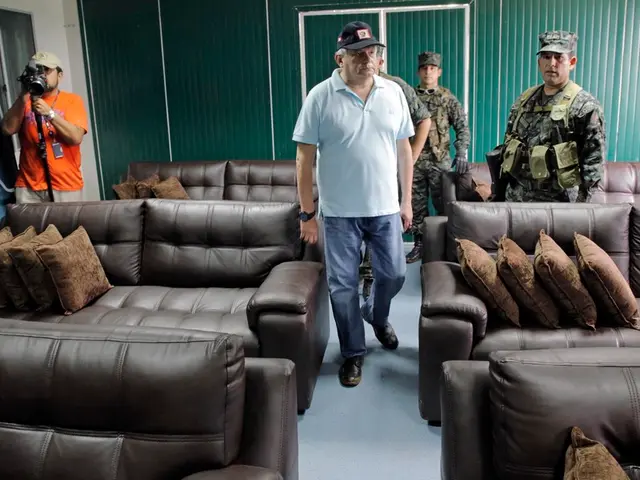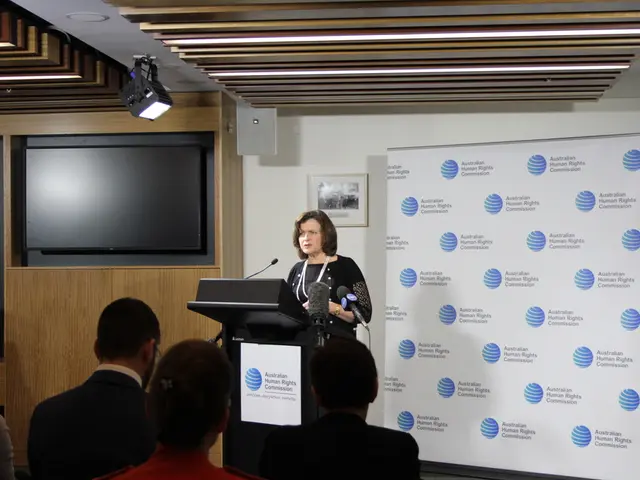Tariffs re-imposed temporarily following court decision, suspending import taxes momentarily
On Thursday, a federal appeals court temporarily restored U.S. President Donald Trump's contentious tariff scheme, keeping in place the import duties on China and other trading partners while the legal challenge proceeds. The decision came after a lower court barred many of the tariffs implemented since Trump took office, asserting that the president had overstepped his authority.
Reacting to the latest twist in his legal tussles over trade policies, Trump expressed anger towards the Manhattan-based trade court, calling it "flawed" and advocating for an immediate reversal. In a lengthy rant on his Truth Social platform, he portrayed himself as a victim of a biased judicial system.
Since his return to the presidency in January, Trump has been reshaping U.S. trade ties with the world while utilizing tariffs to compel foreign governments to negotiate. However, the unpredictable implementation of these tariffs, affecting both allies and adversaries, has led to market volatility and supply chain disruptions.
Prior to the Federal Circuit Court of Appeals' decision to issue an administrative stay, the White House had been given 10 days to halt the affected tariffs following the Court of International Trade's ruling. The Trump administration dismissed the ruling as "manifestly incorrect," and filed an appeal, expressing optimism that the decision would be overturned.
White House spokeswoman Karoline Leavitt told reporters that the judges had "abused their judicial power by encroaching on the president's authority." Leavitt contended that the Supreme Court needed to step in and halt the tariff challenge, while acknowledging that Trump had other legal avenues to impose levies.
Kevin Hassett, director of the National Economic Council, told Fox Business that temporary setbacks, triggered by activist judges' decisions, would not deter trade negotiations, stating that three deals were near completion. Trump's trade advisor, Peter Navarro, announced that several countries had contacted the administration to pledge continued good-faith negotiations, without disclosing their identities.
Trump's tariffs are designed to penalize economies that sell more to the United States than they purchase. The president maintains that trade deficits and the perceived threat from drug smuggling constitute a "national emergency" justifying widespread tariffs—a stance that the Court of International Trade ruled against.
In two separate cases, the federal trade court is considering challenges brought by businesses and a coalition of state governments, alleging that the president has violated Congress's power of the purse. The judges asserted that any interpretation of the International Emergency Economic Powers Act of 1977 that grants unlimited tariff authority is unconstitutional.
Asian markets rallied on Thursday, while U.S. indexes closed higher and European markets closed slightly down. China, which faced additional 145% tariffs before they were temporarily reduced to facilitate negotiations, responded to the trade court decision by urging the U.S. to repeal the levies.
Analysts at London-based research group Capital Economics speculate that the matter may reach the Supreme Court, though it is unlikely to mark the end of the tariff conflict.
- The ongoing tariff dispute between the United States and its trading partners, including China, has drawn attention to the intersection of politics, policy-and-legislation, and business, with the economy at large also impacted.
- The escalating war-and-conflicts in the realm of trade policy and legislation has added another layer of complexity to President Trump's trade strategies, as he faces challenges in the courts and criticism from both allies and adversaries.
- General news coverage has focused on the legal standoff between the administration and the federal courts over trade tariffs, with key players such as the White House, the National Economic Council, and the World Trade Organization deeply involved in this battle of policy and power.








